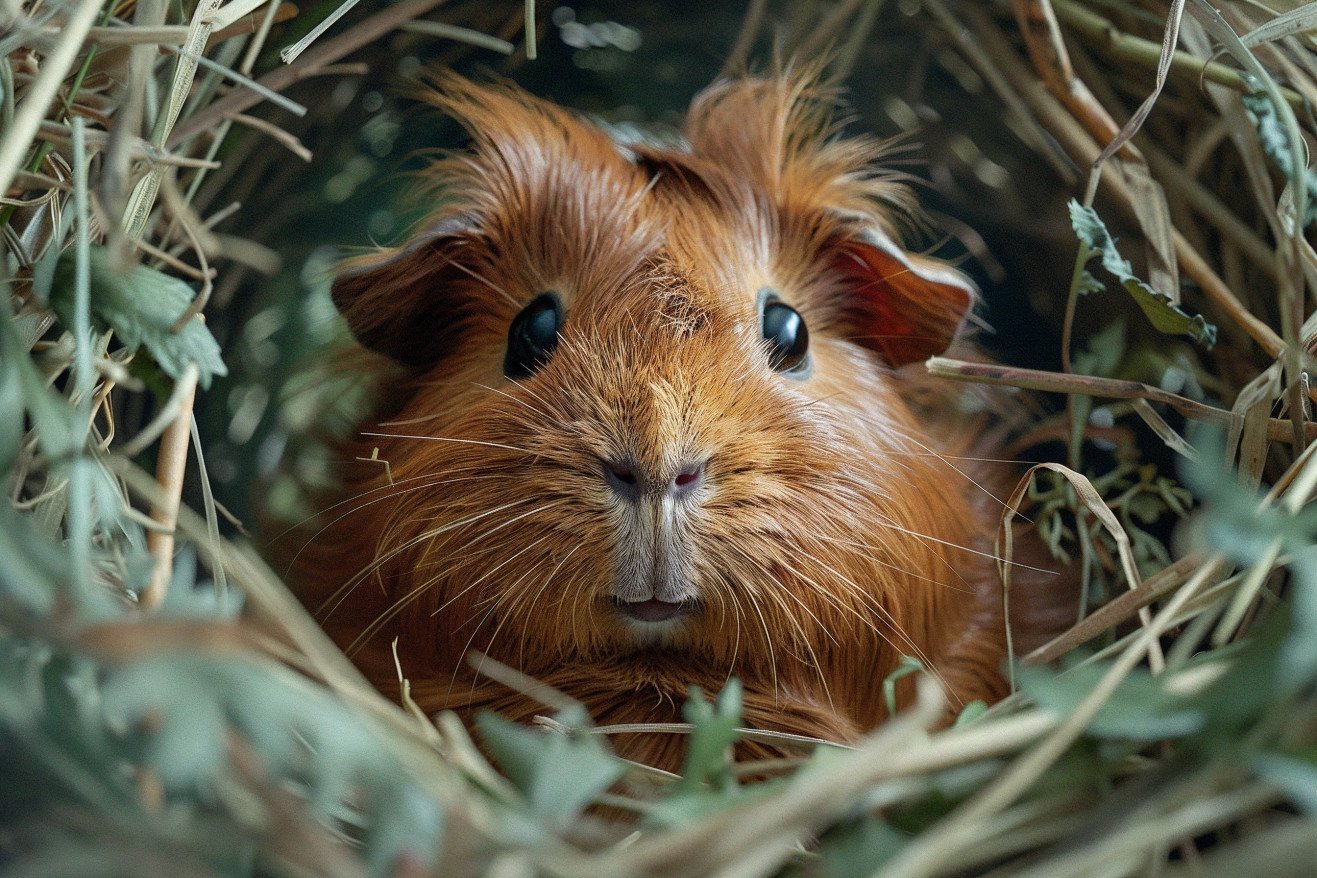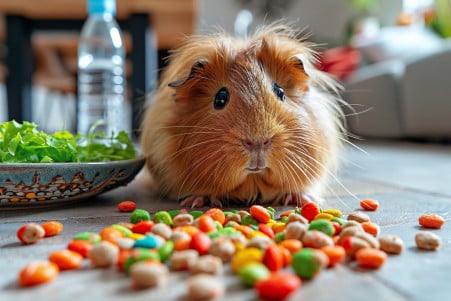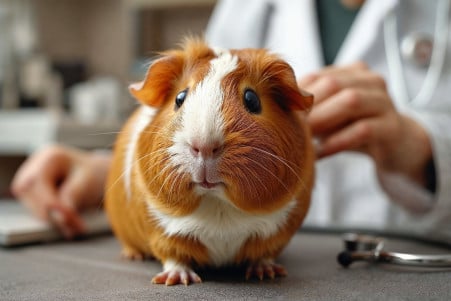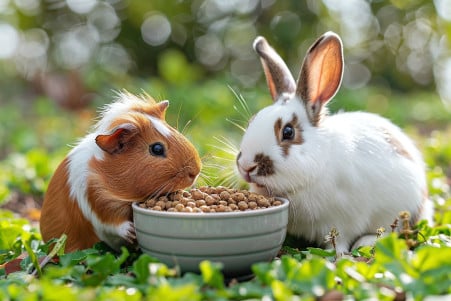How Long Can Guinea Pigs Go Without Eating? What Vets Say
30 May 2024 • Updated 28 May 2024

If you’re a guinea pig owner, you may have asked yourself this question while watching your cute little pet skip a meal or two. While guinea pigs can technically go 6-8 hours without eating before it starts to take a toll on their health, they can only go 48-72 hours without access to water. Because of their high-fiber diet and the way their digestive systems work, guinea pigs need to eat consistently throughout the day to stay healthy.
To help you better understand the dietary needs and limitations of guinea pigs, we’ve gathered information from veterinary research and other expert sources about guinea pig physiology and nutrition. By looking at the studies that have been done on the delicate digestive systems of these animals, you’ll be able to make sure that you’re always providing your pet with enough food and water to keep them healthy and happy for years to come.
How long can guinea pigs go without food?
Toxic Foods and Household Items to Avoid
Keeping your guinea pig safe means making sure that they don't have access to certain toxic foods, plants, and household items. Many everyday items can be poisonous or even deadly to guinea pigs.
Woodgreen lists avocado, citrus fruits (like limes and lemons), onions, garlic, potatoes, and any part of plants that grow from bulbs (like tulips and daffodils) as foods that guinea pigs should never eat. They also note that certain weeds, wildflowers, and garden plants (like ivy, rhododendrons, and buttercups) are toxic, and that the leaves of rhubarb are also problematic.
In addition, guinea pigs should never be given treats that contain sugar, yogurt, or artificial colors or flavors, as these can cause digestive upset. Meanwhile, Sun City Animal Hospital warns that chocolate, nicotine products, certain glues (like Gorilla Glue), and essential oils (like tea tree oil) are all toxic to guinea pigs and can cause severe poisoning.
Symptoms of poisoning in guinea pigs can include difficulty breathing, bloating, kidney failure, chemical burns to the digestive tract, and even death. It's important for guinea pig owners to be very careful because the impact of poisoning can be severe and happen quickly. It's important to make sure that guinea pigs can't access these items at all to ensure their safety.
Symptoms and Side Effects of Anorexia in Guinea Pigs
If a guinea pig is not eating, this is a medical emergency and you should take your pet to the vet immediately. According to FIRST AID | wheekcare, not eating is a very serious issue, as the guinea pig's system will shut down with dire consequences. After as few as 16 to 20 hours of anorexia, liver cells begin to break down and from then on, the pig will only get worse.
Potential causes of anorexia in guinea pigs include overgrown molars, vitamin C deficiency, diarrhea leading to dehydration, and other underlying health issues. FIRST AID | wheekcare explains that drooling, weight loss, and interest in food but inability to eat can be signs of malocclusion, where the molars are overgrown. This can be misdiagnosed as vitamin C deficiency (scurvy).
Symptoms of illness in guinea pigs include a rough or puffed up coat, dull eyes, lethargy, and refusal to eat or drink, according to the PDSA. PetMD states that if anorexia goes on for too long, it can result in rapid weight loss, nutritional deficiencies, and even death.
It is important to have high-quality guinea pig pellets and emergency feed on hand for cases when a guinea pig is not eating, according to FIRST AID | wheekcare. It is also important to seek veterinary care as soon as possible to get to the root of the issue and prevent any further health issues.
Dehydration in Guinea Pigs: Symptoms and Treatment
Guinea pigs can become dehydrated in 12-48 hours if they don't have access to water, which can be fatal according to Arizona Exotics. Symptoms of dehydration include sunken eyes, droppings that are smaller, more teardrop-shaped, dry mouth, and loss of skin elasticity, according to GuineaDad and GuineaLynx.
Dehydration in guinea pigs is often caused by diarrhea because it results in a significant loss of fluids, according to GuineaPigStuff. Dehydration can be treated with oral rehydration, subcutaneous fluids, intravenous fluids, or intraosseous fluids, according to Arizona Exotics.
Guinea pig owners should carefully monitor their pet's hydration and if they suspect dehydration, they should take their pet to the vet immediately since early intervention is important to avoid potentially fatal complications.
How to Get a Guinea Pig to Eat
If your guinea pig is not eating, it is important to first figure out the cause of the issue, which could be anything from dental problems, changes in diet, constipation, stress, or organ problems. According to Kavee, you can use commercial recovery food or homemade options to force-feed your guinea pig and make sure it is getting the nutrition it needs if it is not eating.
The recovery food should be mixed with water and fed in small amounts to make sure that the guinea pig's digestive system is still working. RSPCA suggests that you also try offering fresh, washed leafy greens and vegetables, as your guinea pig may be more likely to eat foods that it recognizes and enjoys. Make sure that any dietary changes are made slowly to avoid further digestive problems, and if your guinea pig is still not eating or losing weight, make sure to take it to the vet, according to RSPCA Victoria.
Feeding Your Guinea Pig a Healthy Diet
A healthy diet is important for a guinea pig's well-being. The Humane Society of the United States explains that a guinea pig's diet should be centered around good-quality hay and fresh grass, which should account for about 80% of what they eat each day. Guinea pigs also need a daily serving of grass-based guinea pig pellets to ensure they get enough vitamin C since they can't make it in their bodies.
RSPCA suggests that fresh, leafy greens and vegetables that have been washed should be offered daily, while fruits and root vegetables should be offered as an occasional treat. The amount of food offered should be adjusted based on the guinea pig's age, size, and activity level to help them maintain a healthy weight, according to RSPCA Victoria.
A diet that includes a mix of hay, grass, pellets, and fresh fruits and vegetables will help ensure that guinea pigs get the nutrition they need to stay healthy.
Conclusion: How to Keep Your Guinea Pig's Diet Healthy
Guinea pigs have specific dietary needs that must be met in order for them to be healthy and happy. This includes making sure they have access to hay, fresh vegetables, and vitamin C-fortified pellets at all times. Owners should also be careful to avoid feeding their guinea pigs toxic foods and other items that can be found around the house, and they should keep an eye out for signs of anorexia and dehydration.
If a guinea pig goes without eating or drinking for too long, they may need to be taken to the vet for emergency feeding. However, by making sure their dietary needs are met, guinea pig owners can ensure that their pets are happy and healthy for years to come.


